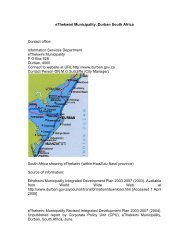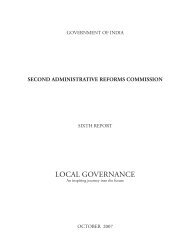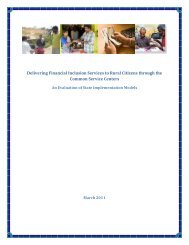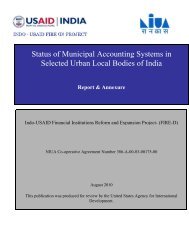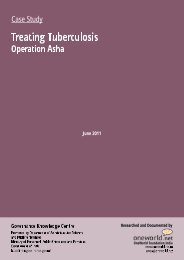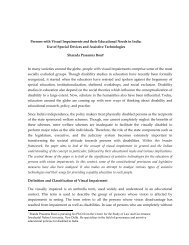Changing Framework of Local Governance and - Create
Changing Framework of Local Governance and - Create
Changing Framework of Local Governance and - Create
Create successful ePaper yourself
Turn your PDF publications into a flip-book with our unique Google optimized e-Paper software.
<strong>Changing</strong> <strong>Framework</strong> <strong>of</strong> <strong>Local</strong> <strong>Governance</strong> <strong>and</strong> Community Participation in Elementary EducationOne commonality in all recently initiated quality improvement programmes has been todevelop the school as an independent institution. Schools are considered the unit <strong>of</strong> change,with schools not only responsible to implement the decisions made for the larger system bythe higher authorities (Govinda, 2000, Govinda. 2004) but it is also given authority to decideabout its own course <strong>of</strong> action <strong>and</strong> setting its own goals <strong>and</strong> priorities. It requires restructuringthe power relationships between different functionaries working at different levels <strong>of</strong>administration including schools. However, changing the `framework <strong>of</strong> power sharing’ is nota simple technical exercise. It can only be pursued through the continued strengthening <strong>of</strong>democratic processes in school governance (Govinda, 2000, 2004). Here, the school becomesthe primary unit <strong>of</strong> all interventions <strong>and</strong> actions meant for enhancing their efficiency <strong>and</strong>effectiveness. This is challenging where schools are under-resourced, small <strong>and</strong> have frequentabsenteeism.Another factor gaining recognition is school autonomy. School autonomy 45 gives schoolsauthority in their effectiveness, since it gives schools decision-making power to conduct theirown activities according to their needs. Grauwe <strong>and</strong> Varghese (2000:7) argue that:….dimensions <strong>of</strong> efficiency namely focus on outcomes, favourable internalmanagement, cost effectiveness <strong>and</strong> equity, should be an integral part <strong>of</strong> an efficientschool.All these dimensions may be achieved to some extent if the schools are allowed to decide theirown course <strong>of</strong> action in three crucial areas (Grauwe <strong>and</strong> Varghese, 2000): i) curriculum; ii)examinations <strong>and</strong> performance evaluation; <strong>and</strong> iii) financing. However, existing examinationsystems <strong>and</strong> funding arrangements would constrain such autonomy to schools accordingly asthese are decided by higher authorities leaving the responsibility <strong>of</strong> implementation onschools.The role played <strong>and</strong> responsibilities borne by head teachers 46 are viewed as critical for qualityimprovement. In efficient schools, head teachers tend to play a pro-active role, provideleadership <strong>and</strong> motivate <strong>and</strong> support the school staff. Based on a study conducted on role <strong>of</strong>head teachers in six states, Govinda (2002:4) states:Field data reveals that effectiveness <strong>of</strong> the management depends heavily on thepersonal initiative <strong>and</strong> leadership <strong>of</strong> the head teacher <strong>and</strong> his or her style <strong>of</strong>maintaining human relationships within the school <strong>and</strong> with the departmentalauthorities....45 “School autonomy implies the relative independence <strong>of</strong> an institution in its operation, to carry out commonlyagreed goals, with a view to making it function more efficiently <strong>and</strong> effectively (Grauwe & Varghese, 2000:7).In reference to school effectiveness, many researchers have raised the issue regarding school autonomy. “Schoolautonomy, might be seen to imply that the school would become a fully self administering unit, completely freefrom external authority <strong>and</strong> influence. But in reality this is never so. The school continues to be seen only as onelevel, the last layer in a hierarchically organized arrangement for management <strong>of</strong> the school education system.”(Govinda, 2000:76)46 In the context <strong>of</strong> school autonomy, it is very important that head teachers are in a position to provide academicleadership to work with their staff on school development plans <strong>and</strong> that they are trained in budgetary processesso that school activities can be prioritized, initiated <strong>and</strong> closely monitored. This is all the more important in asituation where autonomy also implies freedom to operate the funds allocated to school (Grauwe <strong>and</strong> Varghese,2000:11).36




